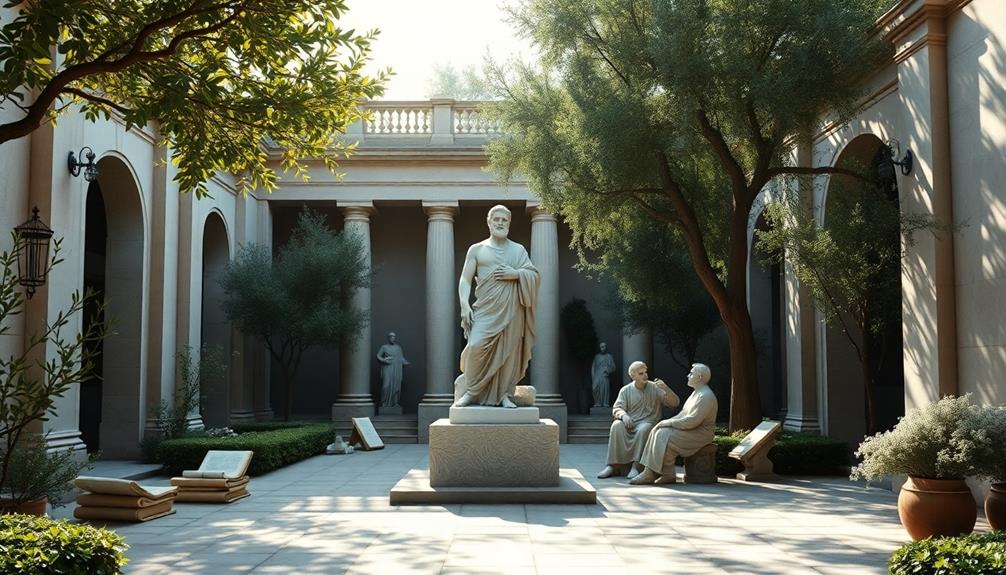Skepticism is your superpower for maneuvering the chaos of everyday life. Ancient Greek philosophers believed it's essential for achieving clarity and peace of mind. By questioning beliefs and suspending judgment, you can reduce anxiety about certainty. This approach encourages open-mindedness and critical thinking, allowing you to evaluate diverse perspectives. Pyrrho, for instance, taught that accepting uncertainty promotes tranquility. Action and belief should guide you, but remember to balance them wisely. Embracing this mindset transforms your interactions and decisions. If you explore further, you'll discover how these principles can reshape your perspective on life's complexities.
Key Takeaways
- Greek philosophers advocate for questioning beliefs, fostering critical thinking and personal growth through inquiry and doubt in everyday life.
- Pyrrhonian skepticism promotes peace of mind by suspending judgment on uncertain claims, allowing for more thoughtful decision-making.
- Engaging with diverse perspectives encourages open-mindedness and helps navigate the complexities of modern information overload.
- The interplay between action and belief is crucial, guiding choices through criteria of plausibility while accepting uncertainty.
- Practicing skepticism reduces existential anxiety and enhances constructive dialogue, promoting empathy and understanding in conflicts.
Understanding Skepticism Today

Skepticism is more than just doubt; it's a powerful tool for steering through the complexities of modern life.
In today's world, where information overload is the norm, adopting a skeptical mindset can help you navigate uncertainty with a critical attitude.
Pyrrhonian skepticism, as highlighted by ancient philosophers like Sextus Empiricus, teaches you to suspend judgment about uncertain knowledge claims.
This practice can foster peace of mind, allowing you to weigh beliefs and decisions without getting bogged down by absolute certainty.
Insights From Ancient Philosophers

Ancient philosophers offer valuable insights into how you can embrace skepticism in your daily life.
By questioning your beliefs and remaining open to different perspectives, you can find a balance between action and doubt that enhances your decision-making.
This approach not only fosters tranquility but also encourages a richer understanding of the complexities around you.
Embracing Inquiry and Doubt
In traversing the complexities of life, embracing inquiry and doubt can be transformative. Ancient skepticism, particularly from Pyrrho of Elis, teaches you the value of suspending judgment on uncertain knowledge claims. By recognizing the limitations of what you can truly know, you open yourself to a more peaceful existence, reducing existential anxiety.
As you investigate deeper into this philosophical exploration, consider how content relevance and authority are prioritized in holistic SEO, which mirrors the importance of critically evaluating information before accepting it.
Figures like Arcesilaus and Carneades from the Academic tradition encouraged you to engage in dialectical inquiry, arguing for and against various propositions. This practice fosters critical thinking and helps you explore your beliefs more deeply. Instead of accepting societal norms blindly, you can question and evaluate them, leading to personal growth.
Embracing inquiry means valuing the process of questioning over mere acceptance. It invites you to critically assess your thoughts and actions, resulting in a more open-minded and adaptable approach to decision-making.
As you cultivate a mindset of skepticism, you'll find that it not only enriches your understanding of the world but also enhances your interpersonal relationships. Ultimately, this journey toward embracing inquiry and doubt encourages a path of continuous learning and self-discovery.
Practical Applications of Skepticism
The wisdom of ancient philosophers offers valuable insights for applying skepticism in everyday life. By engaging with skeptical arguments, you can learn to suspend judgment on knowledge claims that seem unresolvable.
Pyrrho of Elis emphasized that this practice leads to tranquility, allowing you to navigate life's uncertainties with a more peaceful mindset.
Arcesilaus, a key figure in Academic Skepticism, highlighted the importance of dialectical examination. By questioning and debating beliefs, you can better assess their validity, fostering open-mindedness.
Carneades introduced the practical criterion of to pithanon, which helps you evaluate beliefs based on their plausibility, guiding you toward informed decisions without requiring absolute certainty.
Sextus Empiricus pointed out that recognizing the limitations of human knowledge can lead to a more harmonious life. Rather than adhering to rigid beliefs, you can follow appearances and customs, which reduces anxiety and existential distress.
Embracing skepticism helps you challenge societal norms and beliefs, giving you the freedom to explore multiple perspectives. This practice empowers you to live more authentically, embodying the spirit of philosophical skeptics while promoting a balanced approach to knowledge and belief.
Balancing Action and Belief
Recognizing the interplay between action and belief is fundamental for maneuvering life's complexities. Ancient skepticism teaches you that while knowledge claims can often feel uncertain, you can still make decisions and take meaningful actions.
Arcesilaus emphasized suspending judgment on uncertain knowledge, suggesting that you don't need absolute certainty to act effectively. Instead, you can rely on plausible appearances.
Carneades introduced the concept of to pithanon, which allows you to evaluate beliefs and guide your actions while accepting the provisional nature of your knowledge. This approach encourages balancing action with belief, enabling you to navigate the murky waters of uncertainty without being paralyzed by it.
Pyrrhonian skepticism promotes tranquility (ataraxia) by accepting diverse opinions, freeing you from the burden of definitive beliefs. By engaging with multiple viewpoints through dialectical methods, you can make informed decisions while acknowledging the limits of your knowledge.
Ultimately, adopting this balanced approach to belief and action can lead you to a fulfilling life, where you embrace uncertainty as a natural part of existence. In this way, you can thrive amidst the complexities of life, finding peace in the balance of action and belief.
The Role of Inquiry

Skepticism thrives on inquiry, which plays an essential role in how we assess our beliefs and knowledge. Derived from the Greek term "skepsis," inquiry emphasizes examining your knowledge claims instead of accepting them at face value.
Ancient skeptics like Pyrrho of Elis encouraged you to practice "epoché," or suspension of judgment, illustrating the importance of questioning rather than simply asserting definitive answers.
Greek philosophers like Arcesilaus revived Socratic methods by promoting dialectical dialogues that pushed for critical examination of various philosophical positions. This approach invites you to engage in thoughtful discourse, allowing for a more nuanced understanding of complex issues.
Carneades expanded on this by suggesting that your actions should be guided by probable standards rather than absolute certainties, highlighting the importance of context in your decision-making.
Incorporating inquiry into your daily life fosters a mindset that values ongoing exploration and understanding. Rather than seeking definitive truths, you learn to appreciate the complexities of life, recognizing that skepticism leads to deeper insights and informed judgments.
Academic vs. Pyrrhonian Skepticism

A clear distinction exists between Academic and Pyrrhonian skepticism, each offering unique perspectives on doubt and knowledge.
Academic skepticism, initiated by Arcesilaus, emphasizes the inability to know anything with certainty. It advocates for the suspension of judgment on specific knowledge claims, encouraging critical engagement with philosophical arguments. Figures like Carneades suggest practical criteria to evaluate beliefs, guiding you toward actions based on plausibility rather than absolute certainty.
In contrast, Pyrrhonian skepticism, championed by Aenesidemus and Sextus Empiricus, takes a broader approach. It promotes the suspension of belief altogether through the method of epoché, which withholds assent to any claims. This practice aims to achieve tranquility, or ataraxia, rather than engage in intellectual debate. By embracing this radical form of doubt, you can confront the limitations of human knowledge more holistically.
While Academic skeptics target specific doctrines, Pyrrhonian skeptics encourage a more generalized suspension of judgment.
Despite their differences, both forms challenge dogmatic beliefs and highlight the complexities of knowledge, inviting you to explore the nuances of skepticism in everyday life.
Practical Applications of Skepticism

When you apply skepticism to your daily decision-making, you start questioning the information you encounter, leading to better choices. This practice also sharpens your critical thinking skills, helping you sift through conflicting opinions and find clarity.
Daily Decision-Making Practices
Incorporating skepticism into your daily decision-making can transform how you approach uncertainty and complexity. By adopting a skeptical mindset, you can suspend judgment on uncertain propositions, encouraging more thoughtful and less impulsive choices.
Ancient skeptics like Carneades taught us to assess actions based on probable appearances rather than absolute certainty. This practical criterion, known as *to eulogon*, allows you to evaluate beliefs based on their plausibility, giving you the flexibility to navigate complex situations effectively.
Practicing skepticism helps reduce anxiety related to decision-making. Accepting uncertainty and recognizing that not all choices lead to clear-cut outcomes can bring you peace of mind.
Instead of feeling pressured to have unwavering beliefs, you can embrace the ambiguity inherent in life. Engaging in skeptical inquiry encourages you to question societal norms and personal beliefs, fostering a more open-minded approach to your interactions and decisions.
Critical Thinking Development Techniques
Skepticism serves as a powerful catalyst for developing critical thinking skills. By practicing suspending judgment, you create space for open-mindedness, allowing yourself to explore conflicting information without rushing to conclusions. This approach can greatly enhance your critical thinking.
Embracing challenges as opportunities for growth can also help to cultivate a mindset that welcomes inquiry and skepticism, ultimately leading to greater understanding and personal empowerment through personal growth techniques.
Engage in dialectical questioning to dive deeper into your beliefs. By systematically examining these ideas through dialogue, you can uncover underlying assumptions and broaden your understanding.
Incorporate the criterion of plausibility when evaluating beliefs; this flexible standard encourages you to accept ideas based on their practical effectiveness, rather than seeking absolute certainty.
Be aware of perceptual biases that may shape your experiences. Recognizing that different perspectives lead to various interpretations of reality is essential for nuanced critical thinking.
This awareness helps you question your own views and others' claims more effectively.
Embracing Uncertainty in Life

Embracing uncertainty in life can feel intimidating, but it's a powerful way to foster mental tranquility. Ancient skeptics like Pyrrho of Elis highlighted the benefits of suspending judgment on uncertain matters, promoting a mindset that alleviates existential anxiety. By accepting that no belief is superior, you can cultivate open-mindedness and adapt to life's complexities with a flexible mindset.
Here's a quick comparison of approaches to uncertainty:
| Approach | Benefits |
|---|---|
| Embracing Uncertainty | Reduces existential anxiety |
| Rigid Certainty | Creates conflict and distress |
| Open-Mindedness | Encourages diverse perspectives |
| Pyrrhonian View | Fosters mental tranquility (ataraxia) |
When you acknowledge the limitations of your knowledge, you're not just relieving stress; you're also inviting a more harmonious dialogue with others. Rather than clinging to rigid beliefs, consider the multiplicity of perspectives. This practice helps you navigate the information overload of modern life without feeling overwhelmed. So, embrace uncertainty—it's a step toward a more peaceful existence.
Skepticism and Personal Peace

Finding personal peace often hinges on how we approach uncertainty in life. Embracing skepticism can lead to ataraxia, a state of mental calmness. Here are three ways you can cultivate this mindset:
- Suspend Judgment: Acknowledge that not all questions have definitive answers. By practicing epoché, or suspension of judgment, you can reduce anxiety about knowing everything.
- Embrace Acceptance: Accepting the subjective nature of your perceptions helps foster a sense of calm. Understand that your views are just one perspective among many.
- Focus on Coexistence: Instead of engaging in heated debates, aim for understanding and empathy. This shift promotes personal peace and reduces emotional distress.
When you adopt a skeptical attitude, you not only mitigate the existential anxiety tied to absolute truths but also enhance your mental well-being.
By recognizing the limitations of your knowledge, you free yourself from the pressure of needing to resolve every uncertainty. Ultimately, skepticism encourages a tranquil mind, allowing you to navigate life's complexities with grace and acceptance.
Through this lens, you can find clarity and comfort amidst the chaos of the world.
Navigating Conflicts With Skepticism

When conflicts arise, stepping back and examining the situation from a skeptical viewpoint can transform how you engage with differing opinions. Greek skeptics, especially Pyrrhonian thinkers, advocate for suspending judgment. By withholding firm beliefs, you open the door to a more peaceful coexistence with conflicting viewpoints.
Recognizing that no single perspective holds ultimate truth fosters tranquility and understanding among those involved. Embracing skepticism encourages you to acknowledge the limitations of your knowledge. This awareness can considerably reduce the intensity of debates and promote acceptance of ambiguity in discussions.
Instead of aiming to win arguments, a skeptic would suggest prioritizing understanding. This shift can minimize conflict and emotional distress, allowing for more constructive conversations.
Lessons for Modern Living

Skepticism offers valuable lessons for modern living by encouraging you to question assumptions and seek deeper understanding. By embracing these principles, you can foster a more peaceful and fulfilling life. Here are three key lessons to reflect upon:
- Cultivate ataraxia: Recognizing that absolute truths are often elusive can lead you to personal tranquility. Instead of chasing certainty, accept the complexities of life.
- Practice epoché: Suspend judgment to engage with diverse perspectives. This not only reduces conflict but also promotes a more harmonious social environment.
- Embrace open-mindedness: Engage in critical examination of societal norms. By questioning what you accept as true, you become more adaptable and resilient in modern life.
Adopting these lessons can enhance your mental well-being by alleviating the pressure to have firm answers.
You'll find that acknowledging the limits of your knowledge leads to a calmer mindset. By applying the principles of ancient skepticism, you can develop a mindful approach to information consumption, focusing on present experiences instead of being overwhelmed by uncertainties.
In doing so, you pave the way for a more tranquil and enriched existence.
Frequently Asked Questions
What Is Skepticism in Greek Philosophy?
Skepticism in Greek philosophy involves questioning and examining beliefs rather than accepting them. You'll find two main types: Academic skepticism, challenging knowledge reliability, and Pyrrhonian skepticism, promoting suspension of judgment to achieve tranquility.
What Is an Example of Skepticism in Philosophy?
An example of skepticism in philosophy is Pyrrhonism, where you suspend judgment on knowledge claims. This approach encourages you to embrace uncertainty and maintain a peaceful mindset, allowing for a more open exploration of ideas.
What Does Skepticism Say?
Skepticism says you should question beliefs and claims, recognizing uncertainty. Instead of accepting ideas blindly, you examine evidence and remain open to doubt, allowing for a more thoughtful and flexible approach to understanding the world around you.
What Is an Example of a Skeptical Hypothesis?
Imagine wandering in a fog, unsure of your surroundings. A skeptical hypothesis like Descartes' evil demon suggests a powerful deceiver could manipulate your perceptions, making it impossible to trust what you think you know.
Conclusion
Incorporating skepticism into your everyday existence can cultivate clarity and calmness. By embracing uncertainty and engaging in endless inquiry, you'll navigate life's nuances with a nuanced perspective. Just like the great Greek philosophers, you can transform tension into tranquility, fostering a fertile ground for personal growth. So, don't shy away from questioning; instead, let your curiosity guide you. Ultimately, skepticism isn't just a stance; it's a strategy for living a more thoughtful, fulfilling life.









